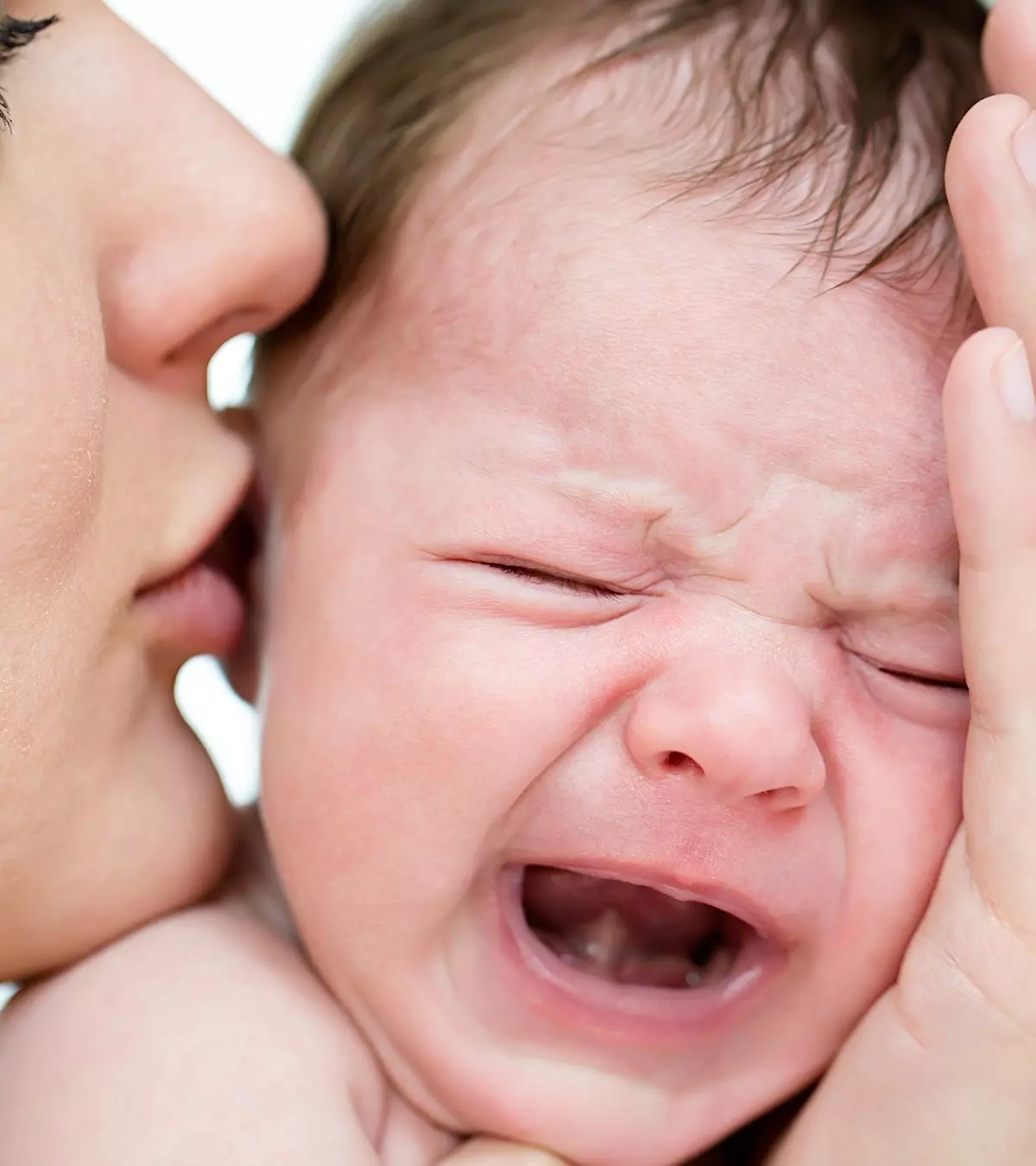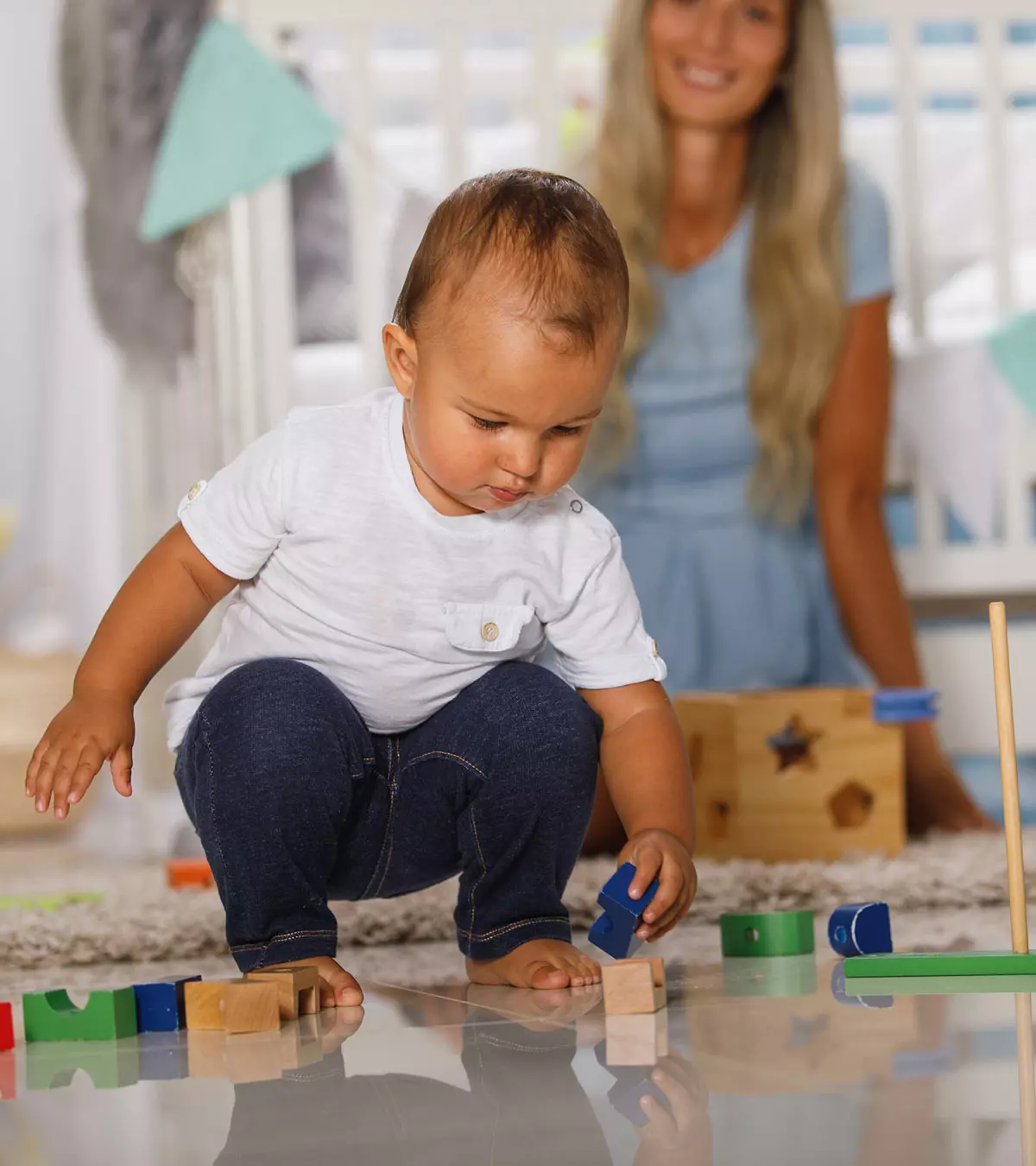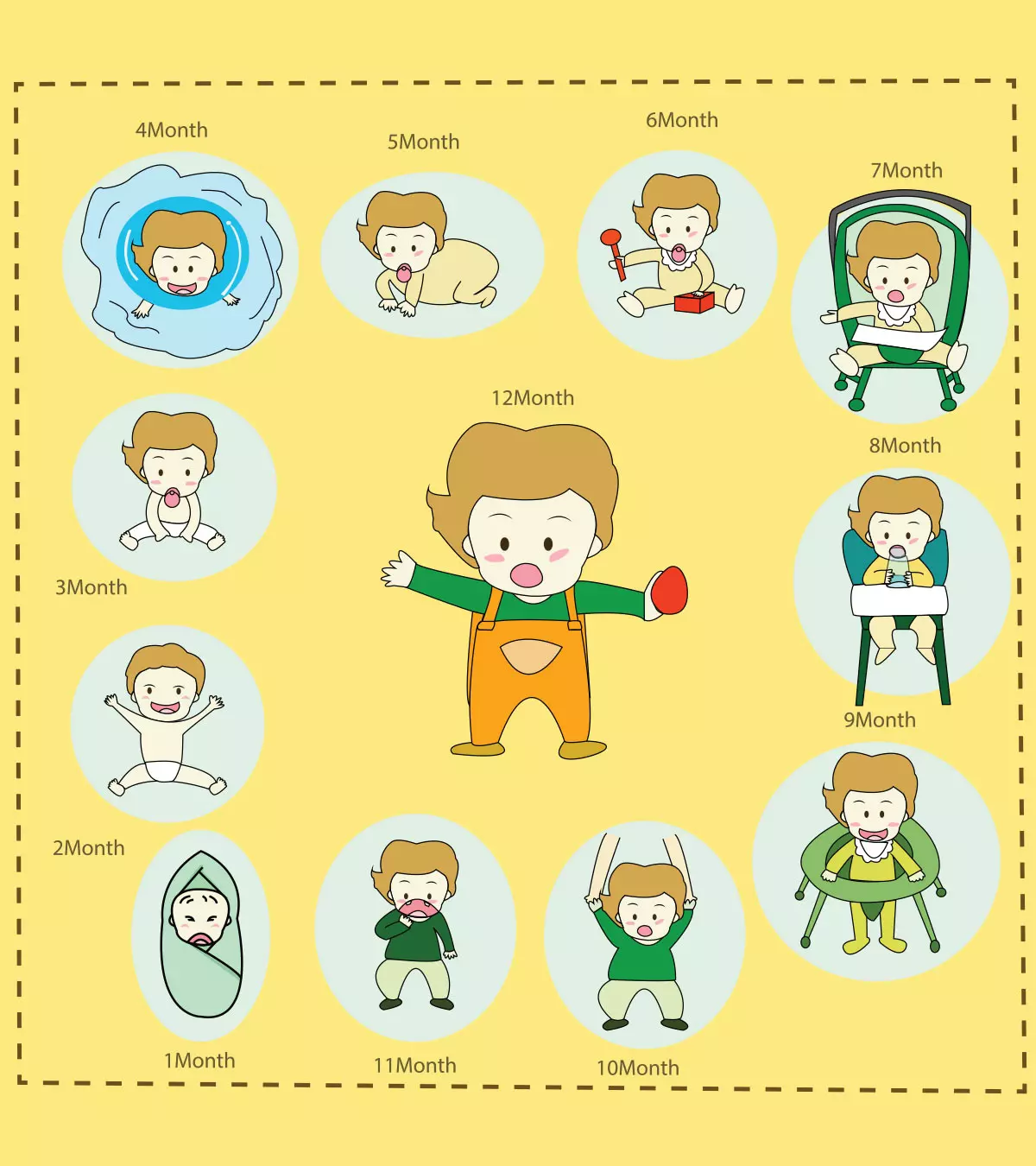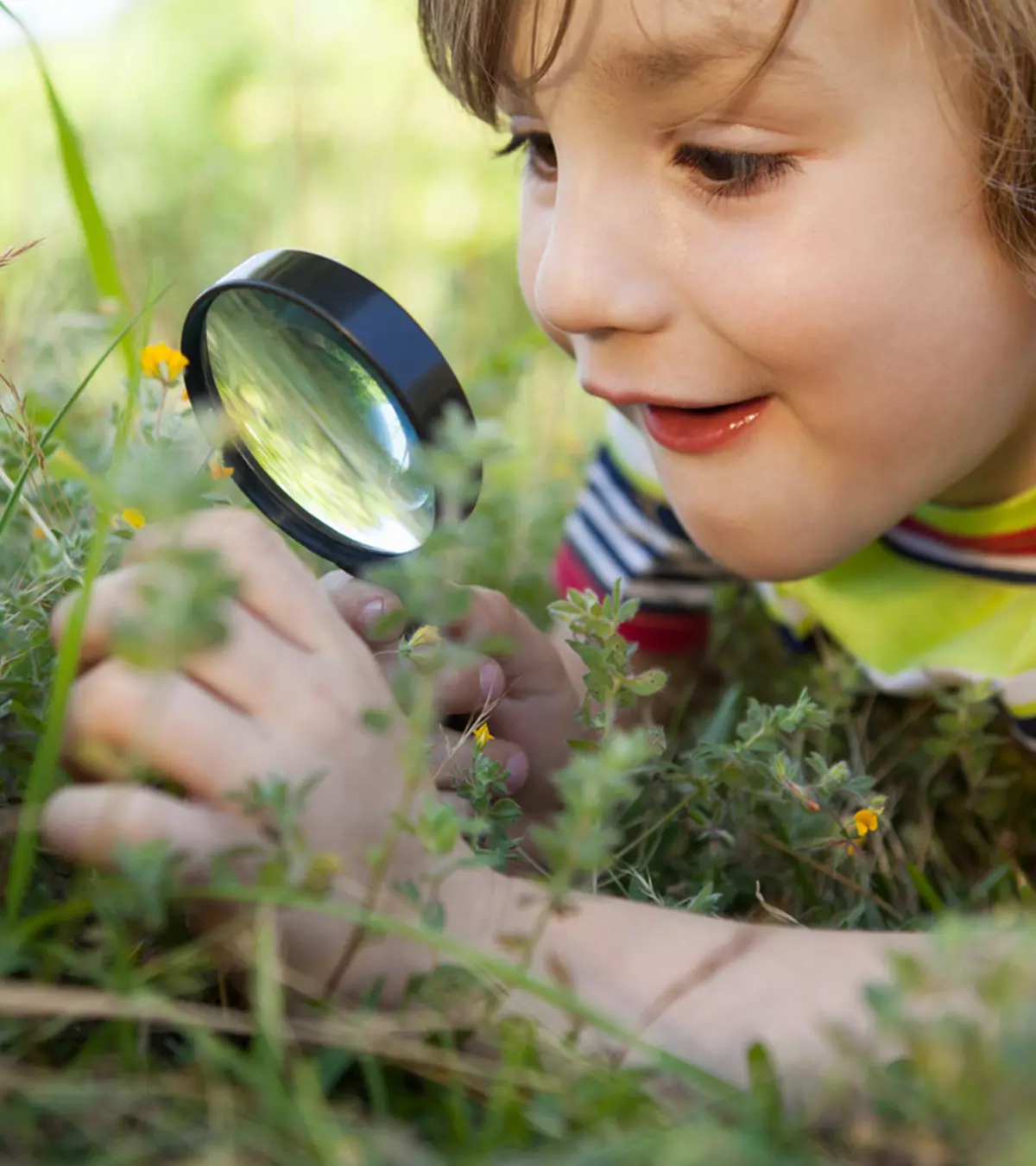
Image: iStock
If your little one sticks their tongue out and makes a fizzy or humming sound, it is known as blowing raspberries. Most babies love doing it, and you may find them trying it for their amusement. While sticking the tongue out and blowing silly sounds comes across as an antic, it has a role to play. Blowing raspberries is a notable skill during infancy and could be essential for a baby’s language development. Read on to learn when babies blow raspberries, the reason behind it, and how to react to it.
Key Pointers
- Babies usually begin blowing raspberries between four and six months of age.
- Blowing raspberries is a part of a baby’s language development or merely a trick to get attention.
- You can imitate your baby or speak or sing to them if your baby is blowing raspberries.
- Blowing raspberries exercises your baby’s facial muscles and promotes voice control experimentation.
- It can also soothe sore gums during your baby’s teething.
When Do Babies Start Blowing Raspberries?
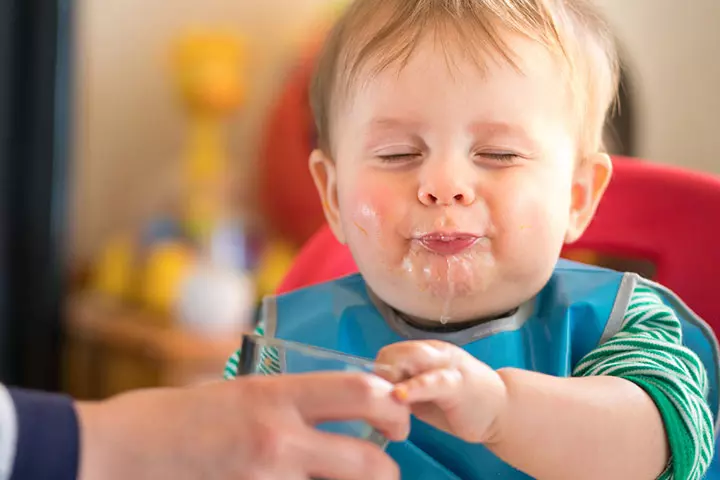
Babies usually start blowing raspberries between the ages of four and six months (1). During this phase, you may also notice your baby cooing and gurglingiA sound resembling the sound of water bubbling . It is common for some babies to begin blowing or pouting raspberries earlier or later, and some may not do it at all. As long as your baby is achieving their vital developmental milestones, it is okay if they blow raspberries later or avoid doing it.
 Experts say
Experts sayWhy Is Your Baby Blowing Raspberries?

Babies may usually blow raspberries as part of their language development. It lets the baby exercise by tapping their tongue and lips and allows them to experiment with all the sounds they can make with them (2). Thus, blowing raspberries is a form of vocal play, and is similar to other types of play that help an infant polish their abilities through games and activities.
Another reason why babies blow raspberries is to gain attention. Babies between the ages of four and six months often respond to sounds by making various sounds to gain parents’ attention (3). They may repeatedly try it to gain attention and entertain themselves by the reaction it elicits from others.
 Research finds
Research findsHow To Respond When A Baby Is Blowing Raspberries?
Blowing raspberries is part of the baby’s normal development, and it is okay to encourage it. Below are some ways to respond to a baby who is blowing raspberries (2).
- Imitate the baby: It is your turn to blow raspberries back at them in response. Apart from imitating the raspberry sounds, also mimics the baby’s other sounds to stimulate language development.

- Respond uniquely: Set aside a unique sound to respond to your baby blowing raspberries. It can help the baby blow raspberries in the context of communication until they can speak.
- Speak to them: The more you talk to your child, the better they learn how to form sounds. Speak to your little one each time they blow raspberries. Talk to them about your day, describe what you are doing, and even ask questions. Respond positively if they answer back with blowing raspberries or cooing sounds.
 Research finds
Research finds- Sing to your baby: Maintain a dedicated song or nursery rhyme that you can sing when the baby begins blowing raspberries. Encourage them to join you along, even if it is through cooing and blowing raspberry sounds. You may also engage them in games that involve sounds, such as peek-a-boo or other music-based games.

- Encourage new sounds: You can even make new sounds and encourage the baby to mimic you. Every new sound helps the baby experiment with different mouth movements, flexing the oral muscles and strengthening them.
Blowing raspberries together also offers a great opportunity for parent-baby bonding. Make sure you maintain eye contact so that the baby is completely engaged.
How Does Blowing Raspberries Benefit A Baby?

Blowing raspberries usually coincides with the baby’s early language development and could play a role in it. It may provide the following benefits to a baby (4) (5).
- Exercise the facial muscles: To blow a raspberry, the baby sticks out the tongue, puckers the lips around it, and pushes the air out. Several voluntary actions happen here, letting the baby exercise control over facial muscles, which play a vital role in speech. In time, it could even help them purse their lips around a spoon or a sipper.
- Learn voice control: Babbling, cooing, and blowing raspberries encourage experimentation with voice control. It could help the baby understand that they can manipulate the voice’s pitch, which is vital when we speak words.
- Experiment with cause and effect: Some babies may blow raspberries only to check the reaction it elicits from caregivers, siblings, and other family members. A baby may act amused or giggle once you respond positively to blowing raspberries. It is the first step towards learning cause and effect and understanding the world through experimentation.
- Improve parent-baby bonding: Since the baby often blows raspberries to interact with the parents, it could improve their bonding. Blowing raspberries is also a great conversation starter for the parent. It encourages activities that parents and babies can try together.
Blowing raspberries is a fun milestone that most babies love once they figure it out. They love it even more when a parent copies them! Laura, a mom and blogger, shares how her four-month-old baby enjoys blowing raspberries, “My baby has a new trick. He’s been like a faucet for about the last month and a half. With all the drool come bubbles—and raspberries!
“He has become a little noisemaker fountain, and he couldn’t be more pleased with himself. The only thing better than blowing raspberries is having someone blow them back (i).”
 Quick fact
Quick fact- Soothe sore gums: Some babies may blow raspberries to soothe their gums while teethingiThe development of teeth through the gums in infants . The gurgling sound and vibration made during blowing raspberries could ease the irritation caused by inflamed gums.
Frequently Asked Questions
1. Is blowing raspberries a milestone?
Blowing raspberries is a fun and beautiful milestone that precedes the beautiful developmental phases of baby babbling and talking. It is also the preceding stage of a baby’s language and speech development and social-emotional development. However, many children skip this milestone and directly begin to babble. If your baby does not use their lips and mouth to make sounds, even at around six months old, consult a doctor (3) (5).
2. How do I stop my baby from blowing raspberries while eating?
If your baby keeps spluttering food by blowing raspberries while eating, give them a gentle but firm reminder that it is not allowed. It sends a message that you will not offer another bite if they keep spitting food. If they continue the behavior, you may pull the spoon and avoid offering them food for a minute or two.
3. Is blowing raspberries a sign of teething?
Some babies may blow raspberries during teething for comfort. Experts at the American Academy of Pediatrics say blowing bubbles might be due to increased saliva, which could be a sign of teething (9).
4. Do all babies blow raspberries?
Not all babies may blow raspberries; some might only drool and blow bubbles briefly, while others may skip this activity altogether. However, if you want to encourage it, try blowing raspberries yourself and making sounds to see if they mimic you (10).
Blowing raspberries is a fun exercise that may support the development of the baby’s verbal skills. Parents can encourage newborns to blow raspberries as early as four to six months of age and even teach them how to utilize it for communication. So, when you see your baby sticking their tongue out at you, imitate them and use this time to boost your bond with them. This activity promotes exercising a baby’s facial muscles and soothing sore gums, and enhances the natural process of inhaling and exhaling air (breathing), among other benefits. However, consonant sounds and simple phrases will progressively replace blowing raspberries as your infant grows older.
Infographic: Is The Baby Not Blowing Raspberries A Cause For Concern?
Blowing raspberries is a developmental milestone that some babies may skip. Nevertheless, they usually make other sounds with their lips and mouth. The absence of any of these sounds may indicate speech impairment or hearing issues. Save this infographic to know the signs that suggest a need to visit a pediatrician. Illustration: Momjunction Design Team
Illustration: Why Is Your Baby Blowing Raspberries What Are The Benefits

Image: Stable Diffusion/MomJunction Design Team
Personal Experience: Source
MomJunction articles include first-hand experiences to provide you with better insights through real-life narratives. Here are the sources of personal accounts referenced in this article.
i. Mommy’s Raspberry Man;https://mommy-miracles.com/2010/07/mommys-raspberry-man.html
References
1. The Growing Child: 4 to 6 Months; John Hopkins Medicine
2. Speech and language development from birth to 12 months; NHS UK
3. Speech and Language Milestones, Birth to 1 Year; C.S. Mott Children’s Hospital
4. Early babbling; Pompeu Fabra University
5. Elizabeth Gutierrez, Language development: The journey through the first two years; Michigan State University
6. Landry et al.; Predicting cognitive-language and social growth curves from early maternal behaviors in children at varying degrees of biological risk; NCBI
7. Claudia Kubicek et al., The influence of infant-directed speech on 12-month-olds’ intersensory perception of fluent speech; Public university in Giessen, Germany
8. Baby Games: 4-6 months; Willamette ESD
9. Drooling and Your Baby; American Academy of Pediatrics
10. How you can help develop your child’s speech; National Health Service
11. Important Milestones: Your Baby By Six Months; Centers for Disease Control and Prevention
Community Experiences
Join the conversation and become a part of our nurturing community! Share your stories, experiences, and insights to connect with fellow parents.
Read full bio of Dr. Richa A Kaushal
Read full bio of Rohit Garoo
Read full bio of Dr. Ritika Shah
Read full bio of Ghazia Shah







